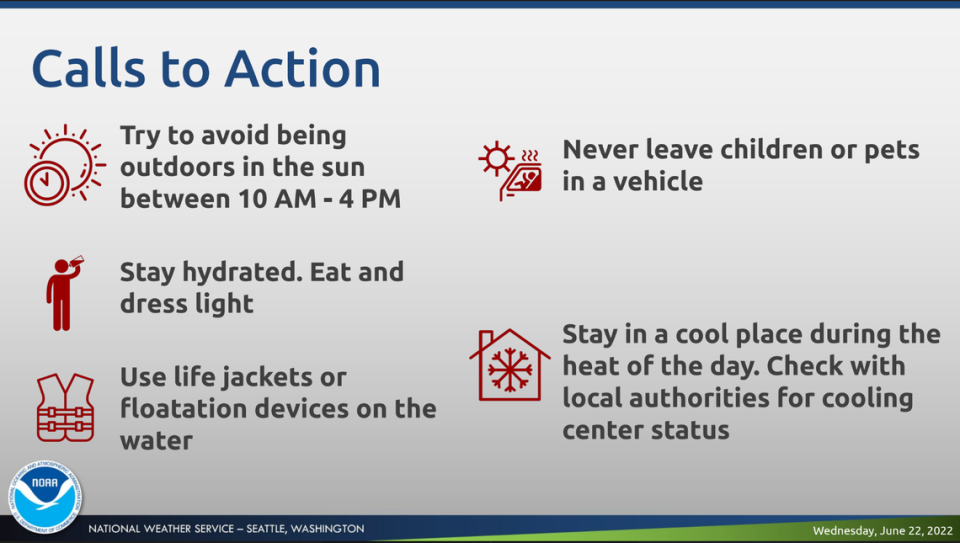‘Please stay out of the water,’ WA state officials implore swimmers ahead of heat spike
Officials in Washington State are begging residents to use extreme caution if their plans include swimming during this weekend’s heat spike.
Despite temperatures that are expected to range about 10-15 degrees higher than typical for this time of year, water temperatures will still be very cold, making hypothermia a real risk. Hypothermia becomes a risk when the water is 70 degrees or cooler.
“After a cool and wet spring, most of the population has little to no acclimation to heat and therefore could be caught off guard by the rapid warm-up,” noted the National Weather Service’s Seattle office in an advisory released on June 22.
The advisory also noted the elevated risk of a “significant increase in cold and high water-related incidents” over the weekend. That is partially due to mountain runoff of winter snow into lakes, rivers and creeks.
Swimming in the Pacific Ocean will also be a cold and risky endeavor. In Pacific County, in particular, home of the longest contiguous peninsula beach in the world and popular tourist destination Long Beach, officials are pleading with the public to avoid the water.
“The water may look inviting, you may think nothing will happen to you, but PLEASE, STAY OUT OF THE WATER,” stated Scott McDougal, director of the Pacific County Emergency Management Agency, in a statement on Wednesday.
McDougal added that “the Pacific Ocean in our county is not a safe place to swim” and noted that people are rescued or die from rip currents every year.
Temperatures will peak on Sunday around the Olympia-Tacoma region, rising from around 85 degrees on Saturday or 89 degrees on Sunday. It’s during this period of time that cold-water incidents can be most prevalent, as people escape the heat of the day into the cold waters around Puget Sound.

Much of the region is in the orange category of heat risk, meaning there is a moderate risk for those who are sensitive to heat, especially without adequate cooling or hydration.
The Weather Service recommends that those who are sensitive to heat avoid being outdoors between 10 a.m. and 4 p.m. and eating and dressing lightly.

Risk of hypothermia
There is also the risk of hypothermia this weekend, no matter where you are. Hypothermia is when your body loses heat faster than it can produce it, and it can lead to unconsciousness, hospitalization and death if not treated quickly enough.
Swimming in water that’s too cold isn’t safer if you are near the shore, a boat or a dock. When it comes to hypothermia from swimming in water that is too cold for the human body, experts say there is a 1-10-1 rule: a swimmer has one minute to control their breathing after they go into cold water shock, which happens within three to five minutes. There are then about 10 minutes for self-rescue, and one hour before becoming unconscious due to hypothermia.
There are multiple ways to protect yourself, including always wearing a life jacket. One of the stages of hypothermia known as “swim failure,” happens three to 30 minutes after exposure but before hypothermia begins to set in.
For those planning on a more inland destination or spending time near the water but not in it this weekend, the Washington State Department of Ecology maintains a map of beaches with real-time information about closures by county, or a larger map with a search function for a specific location. The Ecology department also maintains a toxic algae bloom update site with a searchable feature. If you want to find a beach in your county, the state’s beach list can help.
More information about cold water exposure can be found at the National Center for Cold Water Safety.

